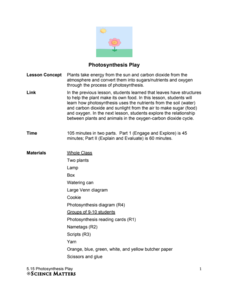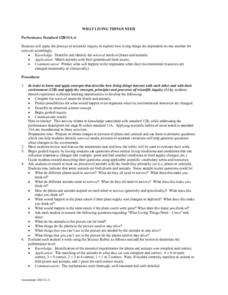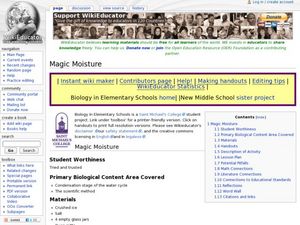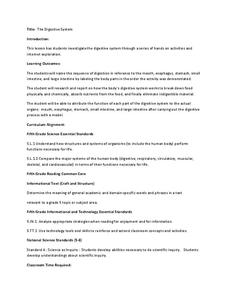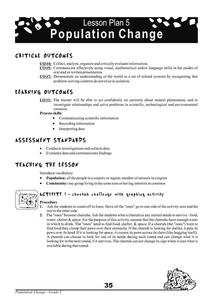Curated OER
Interdisciplinary Approach to Investigating Popcorn
Students conduct a lab experiment using the scientific method. In this interdisciplinary lesson plan, students will test the difference in popping white and yellow corn. Students will write their lab report in their science, math,...
Mascil Project
Molecular Gastronomy - Science in the Kitchen
Some say cooking is an art—and a science! Scholars scope out the savory subject of molecular gastronomy with a series of related activities. The teacher's guide contains printable worksheets and helpful tips for implementing the...
Curated OER
Sharks
Students research sharks, the food chain, and the water habitat shared by humans and sharks.
Science Matters
Photosynthesis Play
Photosynthesis seems nothing short of magic: a little carbon dioxide and water, add energy, and poof, you get food! A thorough, collaborative lesson teaches youth the process of photosynthesis thanks to a skit they perform with a group...
Curated OER
What Living Things Need
Students apply the process of scientific inquiry to explore how living things are dependent on one another for survival. They match animals with their generalized food source. Students predict what happens to the organisms when their...
Curated OER
Experiences and Experiments - There is a Difference
Sixth graders plan and conduct an experiment on food spoilage. They design the experiment, create a display, record and analyze data, and make inferences regarding the results of the experiment.
Curated OER
Farm Products Help Me Grow
Students view a display of empty food containers (or illustrations). They select a food and decide as a class if it has an animal or plant origin. Students view a display of common farm animals that are commonly eaten (cow, pig, chicken,...
Curated OER
Industrial Agriculture
Students write about the benefits that industrial agriculture has had on growing crops. In this industrial agriculture lesson plan, students research how technology has impacted the processing speed of growing food.
Curated OER
Unfold the Mystery of Mold
Middle schoolers research the conditions in which molds thrive. They apply the scientific method to develop a hypothesis, conduct research and test results.
Curated OER
Great Flathead Lake Ecosystem Mystery
Pupils analyze data to solve the mystery of what contributed to an ecological disaster at Great Flathead Lake. They read and graph the available data, create a food web of the problem ecosystem, and construct a formal problem statement...
Curated OER
Chew on This
Eighth graders explore and demonstrate the seven steps of the scientific method. They predict how much sugar is in chewing gum and test, analyze, and calculate the sugar content of gum.
Curated OER
Magic Moisture
Young scholars discover the process of condensation. In this experimental lesson, students hypothesize and conduct an experiment to determine where the water comes from during condensation.
Curated OER
Roll Away Trees
First graders participate in a simulation involving newspaper, food coloring, water, and more to observe the debarking process of producing wood. In this wood lesson plan, 1st graders also measure, and learn about reducing, reusing, and...
Curated OER
The Digestive System
Discover how the human body's digestive system works with a brain and stomach friendly activity. Scholars taste test a variety of foods to find out how they behave once in the mouth. Class members then play a game called Move That...
Curated OER
Little Bees, Big Potential
After reading an article on the alfalfa leafcutting bee, learners chart its characteristics alongside those of the honeybee. Then they draw the leafcutter lifecycle. The article provides fascinating reading when studying the role of...
Curated OER
Personal Narrative Paragraphs: Class Quilt
Begin this activity by asking third graders to bring from home pieces of cloth that represent something important to them. (Have extras for learners who need them.) They reflect on important events in their lives, compose narrative...
Curated OER
Ocean Life
Students explore the topics of ocean water salinity, ocean life zones, marine life classification, and ocean food chains. They observe demonstrations, conduct experiments, complete quizzes and handouts, and analyze key vocabulary.
Curated OER
Biology Project: Gone Fishing
Students write a scientific article using data and prediction skills. In this scientific writing lesson, students access data about fishing off the coast of New Jersey. They look at satellite data, fluorometry and CTD data over a 3 -4...
Curated OER
Growing A Coral Skeleton
Learners research the growth of coral. In this coral polyps lesson, students simulate the growth of coral by using available materials to grow crystals. Learners record observations in a scientific journal.
Virginia Department of Education
Photosynthesis and Cellular Respiration
Provide high schoolers with their own indoor gardens! Emerging scientists discuss the process of photosynthesis and germinate seeds before growing plants in multiple lighting conditions. The hands-on application allows pupils to see...
Science 4 Inquiry
Edible Plate Tectonics
Many people think they can't observe plate tectonics, but thanks to GPS, we know that Australia moves at a rate of 2.7 inches per year, North America at 1 inches per year, and the Pacific plate at more than 3 inches per year! Scholars...
Curated OER
Organic and Inorganic Waste
Students conduct a scientific investigation about organic or inorganic waste. For this organic or inorganic waste lesson, students create a compost heap to determine the difference between inorganic and organic waste. Students record...
Curated OER
Lab Experiments in Nutrition
Looking for authentic hands-on nutritional experiments? High schoolers will perform experiments to test for the presence of vitamin C in several solutions as well as the effect of caffeine on Daphnia. They will also consider the...
Cheetah Outreach
Population Change
Your youngsters become cheetahs in search of food, water, shelter, and space in a fun physical game that does a fantastic job of representing fluctuating species population based on resources available over years.





